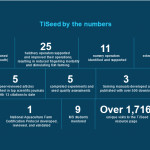Experts said that Bangladesh’s shrimp production sector continues to be plagued by significant structural problems although there have been some improvements in yields and farmers’ adoption of modern technologies, including in farm and feed management.... Source: IFPRI Bangladesh Country Office
Shrimp farmers barely get financial support: study
Shrimp farmers in Bangladesh barely get any financial support, especially from formal institutions, as they lack the required collateral, according to a study by the Consultative Group for International Agricultural Research (CGIAR). CGIAR is a global ... Source: IFPRI Bangladesh Country Office
Tiseed Project Dessimination Workshop
Ghana is West-Africa’s top producer of tilapia. Growth in Ghana’s aquaculture sector is being driven mainly by large-scale cage tilapia farming in Lake Volta. Tilapia contributes over 77% of cultured fish production, the second being African catfish at 22%. Unfortunately, participation of, women, and youth in this rapidly growing value chain is very limited. About […] Source: IFPRI Ghana
Impact of fish feed formulation training on feed use and farmers’ income: Evidence from Ghana
Feed accounts for 60–80% of tilapia production costs, and high feed cost and limited feed access are major issues faced by fish farmers. A potential solution is for farmers to produce their own feeds using cheaper and locally available ingredients. This paper evaluates the feed formulation training implemented in Ghana as part of the Fisheries […] Source: IFPRI Ghana
Immediate impacts of COVID-19 on the aquaculture value chain in Ghana
Ghana’s aquaculture sector is among the recent success stories of fast-growing agricultural value chains in Africa south of the Sahara. The sector has also shown its vulnerability, with the infectious spleen and kidney necrosis virus spreading through tilapia farms in Lake Volta in late 2018. The global COVID-19 human pandemic reached Ghana in early 2020, […] Source: IFPRI Ghana

